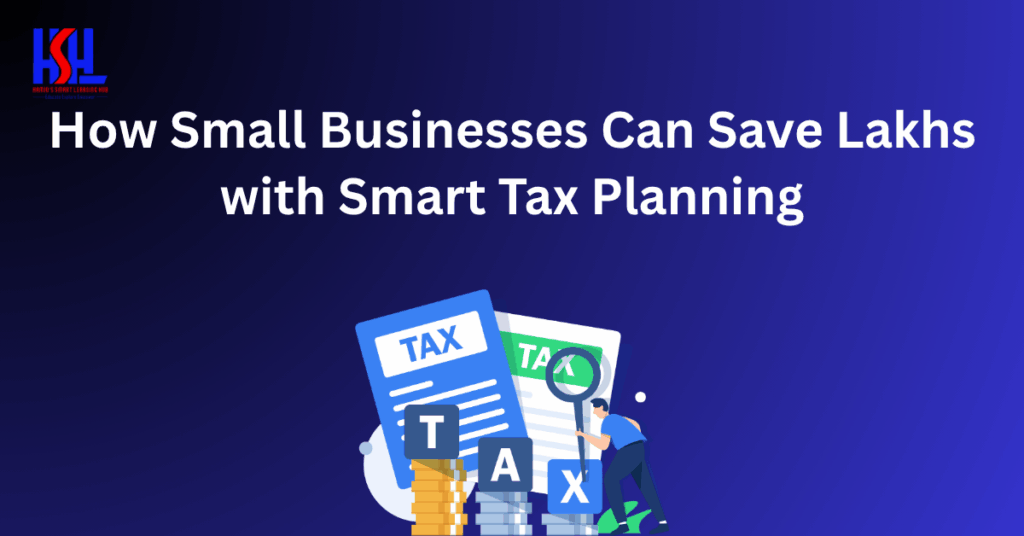How Small Businesses Can Save Lakhs with Smart Tax Planning
Introduction
Running a small business in India is no small feat. From managing cash flow to acquiring customers, entrepreneurs juggle countless responsibilities daily. But there’s one often-overlooked area where small business owners can save lakhs of rupees annually—smart tax planning.
In this blog, we’ll break down practical, legal tax-saving strategies that small businesses can implement right away to reduce their tax burden, improve cash flow, and reinvest in growth.
1. Choose the Right Business Structure
The legal structure of your business significantly impacts your tax liabilities. Here’s a quick comparison:
Business Type | Tax Rate | Key Benefit |
Sole Proprietorship | Slab-based (up to 30%) | Easy setup, minimal compliance |
Partnership Firm | Flat 30% + cess | Shared responsibilities |
LLP | Flat 30% + cess | Limited liability, less compliance |
Private Ltd Company | 22% (for domestic cos) | Better funding options, lower rate |
Tip: If you’re scaling or seeking investment, registering as a Pvt Ltd company could save taxes and open more financial doors.
2. Claim All Legitimate Business Expenses
Every rupee you spend for business purposes can reduce your taxable income. Common deductible expenses include:
- Rent for office/shop
- Utility bills (electricity, internet, water)
- Salaries and wages
- Marketing & advertising costs
- Professional services (legal, CA, consulting)
- Depreciation on laptops, machines, furniture
- Office supplies and software subscriptions
Tip: Maintain digital records of all invoices. Use tools like Zoho Books, QuickBooks, or Tally for proper documentation.
3. Use Section 80 Deductions Wisely
Just like individuals, businesses (especially proprietors and partners) can claim deductions under various sections:
- 80C – Investments in PPF, ELSS, LIC (up to ₹1.5 lakh)
- 80D – Health insurance premium (up to ₹25,000)
- 80G – Donations to charities (up to 100% in some cases)
- 80JJAA – Deduction for hiring new employees
Tip: Plan these investments early in the financial year, not just in March.
4. Register Under the Presumptive Tax Scheme (if Eligible)
If your turnover is less than ₹2 crore, you can opt for the Presumptive Taxation Scheme under Section 44AD.
- Pay tax only on 8% of turnover (6% if digital transactions)
- No need to maintain detailed books of accounts
- No audits required
This can significantly reduce compliance burden and tax outflow.
5. Claim Depreciation on Assets
Purchased a laptop, printer, or furniture? Use Section 32 to claim depreciation on fixed assets.
- Laptops: 40%
- Furniture: 10%
- Vehicles: 15%
- Plant & machinery: 15%–40%
Tip: If you buy the asset before 30th September, you get full-year depreciation benefits.
6. Plan Salary Structure Smartly
If you pay yourself or your staff, design the salary structure to minimize tax outgo. Include:
- HRA (House Rent Allowance)
- LTA (Leave Travel Allowance)
- Reimbursements (fuel, phone bills)
- EPF and NPS contributions
Tip: Even if you’re the owner, pay yourself a regular salary through the business and claim it as an expense.
7. Separate Personal & Business Expenses
Many entrepreneurs make the mistake of mixing personal expenses with business accounts. This leads to:
- Disallowed deductions
- Confusing tax calculations
- Poor audit readiness
Tip: Open a separate current account for your business. Use a credit card solely for business expenses.
8. Hire a CA or Tax Advisor
A qualified Chartered Accountant can help you:
- Identify all possible deductions
- Choose the right taxation regime (old vs new)
- Plan quarterly advance taxes
- File timely and accurate returns
Tip: Consider this as an investment, not an expense. A good tax planner can save you ₹1 lakh–₹5 lakhs or more per year depending on your revenue.
9. Stay GST-Compliant
If your turnover exceeds ₹20 lakhs (₹10 lakhs in some states), GST registration is mandatory.
Benefits of GST compliance:
- Input Tax Credit (ITC) on purchases
- Eligibility for tenders or large contracts
- Enhanced credibility
Tip: File GST returns monthly/quarterly on time to avoid penalties.
10. Use Government Schemes and Subsidies
The government of India offers several tax and credit-linked incentives for MSMEs:
- Startup India Tax Holiday
- MSME Udyam Registration Benefits
- MUDRA Loans with 0% or low interest
- Credit Linked Capital Subsidy Scheme (CLCSS)
Tip: Explore https://msme.gov.in/ for updated schemes.
Final Thoughts
Tax planning is not about evading taxes—it’s about understanding your rights, using the law to your advantage, and growing your business legally and ethically.
Even if you’re a small business with a few lakhs in revenue, smart tax strategies can save you ₹1–5 lakhs or more annually. That’s money you can reinvest into marketing, hiring, product development, or your own financial goals.
Need Help with Tax Planning for Your Business?
👉 Let a professional guide you through a personalized strategy to save lakhs in taxes.
📞 Contact us for a free 20-minute consultation today!


